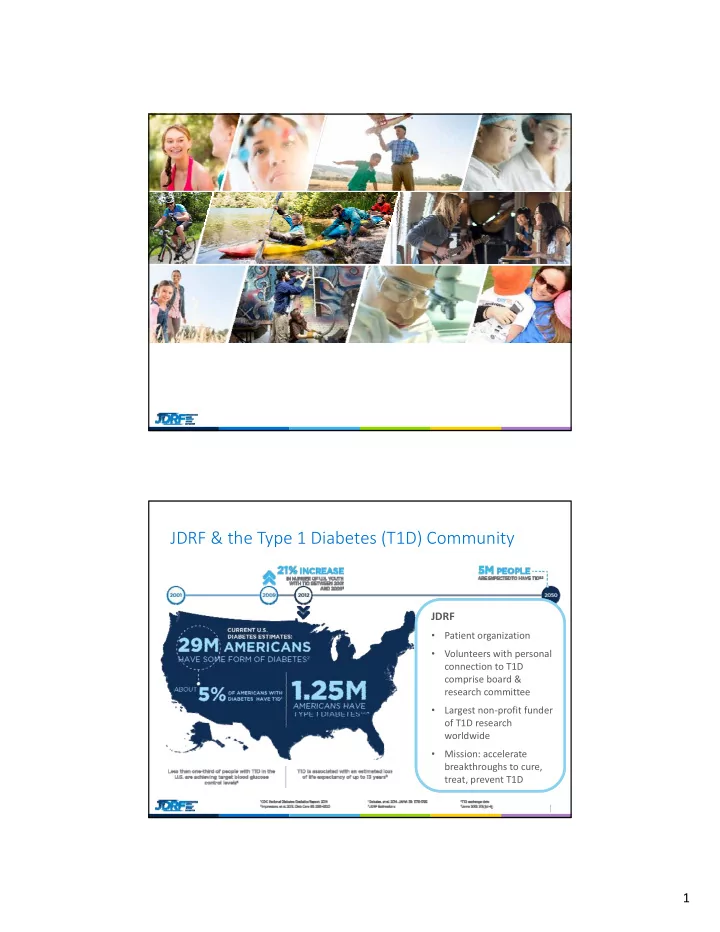

JDRF & the Type 1 Diabetes (T1D) Community JDRF • Patient organization • Volunteers with personal connection to T1D comprise board & research committee • Largest non-profit funder Largest non profit funder of T1D research worldwide Mission: accelerate • breakthroughs to cure, treat, prevent T1D 1
About Type 1 Diabetes (T1D) Life-threatening autoimmune disease requiring intensive insulin therapy and monitoring py g Intensive insulin therapy provides glycemic control Adequate glycemic control delays or prevents onset of long term, serious complications (e.g., kidney failure, blindness, heart attacks, and stroke) Intensive insulin therapy creates risk and fear of hypoglycemia py yp g y 3 How are We Doing? Most with T1D are Not at Goal Average Current HbA1c by Age 9 8.5 Mean HbA1c 17yo 8 6yo 7.5 M 30yo HBA1c Goal 7 0 5 10 15 20 25 30 35 40 45 50 55 60 65 70 75 80 Age, years* * ≤ 2 years old and ≥ 80 years old are pooled 4 4 2
Challenges of Hypoglycemia & Diabetic Ketoacidosis (DKA) in Adults with T1D Severe Hypoglycemia Resulting in Seizure or Loss of • Severe Consciousness in Past 12 Months Hypoglycemia is relatively common, regardless of A1c • DKA risk Diabetic Ketoacidosis Requiring Overnight increases Hospitalization in Past 12 Months p dramatically with A1c, but persists at all A1c levels 5 Hypoglycemia is Problematic in All its Forms Severe hypoglycemia can cause seizures, comas, deaths Mild Mild and moderate hypoglycemia can cause d d t h l i Disorientation Falls, accidents Work, life disruptions And can lead to severe episodes Fear of hypoglycemia can cause poor glucose control 6 3
Nocturnal Hypoglycemia is Especially Dangerous for Individuals with T1D Studies report that 55% of severe hypoglycemia episodes occur during sleep An estimated 2-4% of deaths in individuals with T1D have been attributed to severe hypoglycemia Buckingham B, Block J, Burdick J, et al. Response to nocturnal alarms using a real-time glucose sensor. Diabetes Technol Ther. 2005;7:440– 447; Cryer PE, Davis SN, Shamoon H. Hypoglycemia in diabetes. Diabetes Care. 2003; 26:1902-1912. 7 Rates of Hypoglycemia are Too High 12-MONTH FREQUENCY OF SEVERE HYPOGLYCEMIA* BY AGE 20% 18% 16% 16% 14% 12% 13% 10% 11% 8% 9% 6% 7% 4% 5% 5% 4% 2% 0% <6 6-<13 13-<18 18-<26 26-<31 31-<50 50-<65 ≥ 65 Age (years) * 1 or more events in 12 months; Severe hypoglycemia = seizure or loss of consciousness. 2014 T1D Exchange registry data on file through August 2014 N=14,163 (>70 sites in USA) https://t1dexchange.org/ 8 4
Key Decision Makers are Focused Narrowly on HbA1c Decision makers are not always aware of or know how to value other T1D outcomes such as hypoglycemia other T1D outcomes such as hypoglycemia Impacts decision making related to diabetes therapies Impacts access to diabetes therapies Additionally, healthcare provider payments are increasingly tied to outcomes (e.g., HbA1c), which impacts clinical practice 9 T1D Outcomes Program Collaborative initiative of JDRF, patients, clinicians, researchers Recognition that more than HbA1c matters to patients R i i h h HbA1 i Agree on definition and measurement of outcomes like hypoglycemia to: Appreciate all types of hypoglycemia as meaningful Ensure outcomes are measured as endpoints in clinical trials Gain agreement from regulators on use of outcomes in Gain agreement from regulators on use of outcomes in regulatory decision-making Expand diabetes outcomes accepted by US payers 10 5
T1D & HYPOGLYCEMIA How Congress Can Help Continuous Glucose Monitors, an important tool for reducing hypoglycemia, are not covered by Medicare are not covered by Medicare 95% of commercial payers provide CGM coverage Recommended by all diabetes clinical guidelines Cosponsor Medicare CGM Access Act (S 804 & HR 1427) to address gap 11 6
Recommend
More recommend